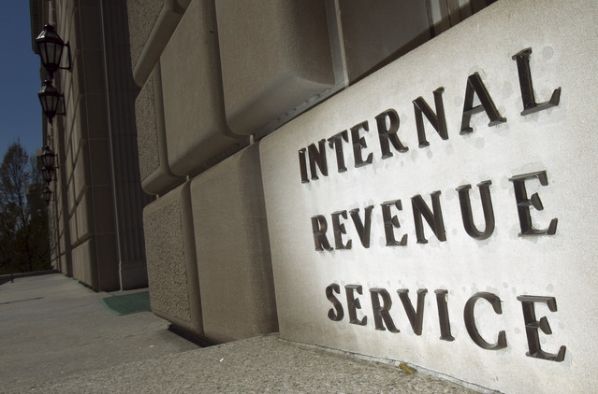"Part of being president is that there's so much beneath you that you can't know because the government is so vast."
–David Axelrod, longtime Obama adviser
Leaving aside that this remark is only intended to isolate the president from the IRS scandal, Axelrod has a point: government is too big.
Rep. Paul Ryan was on a Sunday show yesterday saying that he and Mitt Romney were running against President Obama’s rhetoric of big government. But now, barely into the president’s second term, we are seeing the reality of big, intrusive government.
The IRS scandal is one that conservatives should not let go to waste. No, of course, I don’t mean that in an Alinksyite way of using chaos to further goals. I mean that it shows so clearly the perils of big, intrusive government. The IRS scandal is a good time to talk about abolishing the IRS.
“No dissenter can ever rest assured he is safe from the arbitrary power of the IRS,” Sheldon Richman writes in a Reason magazine piece headlined “Abolish the IRS (and the Income Tax with It).” Richman writes:
Nothing will have been learned from this scandal if all that happens is the firing of some IRS administrators and the issuance of new guidelines on 501(c)(4) applications. That is not nearly enough.
Of the nonprofit exemption he writes:
Where possible, people will naturally strive to qualify for exemption by pushing the boundaries of the regulations. That incentive will always be strong because a nonprofit organization that is exempt from taxation will have more resources with which to pursue its mission. Since the language of statutes and regulations is inevitably vague, the IRS will have room to interpret when ruling on who qualifies and who doesn’t qualify for exemption. The line between vigilance and harassment is not bright, and the potential for abuse is great.
It should be apparent that this power, which is inherently arbitrary, ill suits a society that sees itself as free. …
What exactly constitutes the common good and general welfare of the people of the community, or civic betterment and social improvements? The IRS will let you know. What does “primarily” mean and how does it relate to the seemingly contradictory exclusivity requirement? This is subject to a “facts and circumstances” test — that is, the IRS will decide. Approved activities are generally regarded as educational, but how broadly or narrowly that term is interpreted is left to the IRS and, if challenged, to the courts. Lobbying for “legislation germane to the organization’s programs is a permissible means of attaining social welfare purposes.” However, direct or indirect participation in political campaigns is not regarded as promotion of social welfare — although an organization “may engage in some political activities, so long as that is not its primary activity. However, any expenditure it makes for political activities may be subject to tax.”
As this demonstrates, once government undertakes to tax income, it acquires even more power through its authority to define “income,” “taxable income,” subsidiary terms, and the rules of exemption. There is no escape from arbitrariness and caprice.
Richman says ending the tax exempt status of certain kinds of organizations is not enough:
There’s a better way to go that’s demanded by liberty and justice. Since taxation is nothing less than the confiscation, under threat of force, of what belongs to productive individuals, it has no place in a free society. In other words, everyone should be exempt from income and other taxation. (Americans lived without income taxation for more than 125 years.) If something can’t be accomplished through consent, contract, and cooperation — without aggressive force — we should ask whether it is worth doing.
When the income tax was first proposed in America years ago, opponents always had the same word of warning: inquisitorial. How right they were.
Okay, most of us aren’t quite that radical. Most of us, even those who deplore the exorbitant level of taxation to which Americans are subjected, aren’t going to go that far.
But there are ways to reform our tax system and get rid of the IRS. Steve Forbes, for example, has proposed introducing a flat tax and “using a postcard to abolish the IRS.”
The matter of the power of the IRS came up repeatedly during the GOP primary. It may have seemed abstract at the time. It no longer seems so.
If there was ever an opening to talk about reforming our tax system and eliminating the most feared agency in government, it is now.
But back to the issue Axelrod was striving so mightily to keep in check: Is the president culpable for what happened at the IRS?
I’ve been thinking lately about King Henry II of England. Henry didn’t have the tea party to content with but he did have that annoying Thomas a Becket of Canterbury trying to thwart his power. In a moment of high dudgeon, Henry shouted, “Will no one rid me of this troublesome priest?”
Note: Henry didn’t order four knights to seek out the archbishop in his cathedral and cut him down. But the knights sensed from what Henry had said that such actions would not come amiss. Of course, Henry was blamed—held accountable, in the modern cliché—and did penance.
President Obama made it clear in speech after speech that he regarded the tea party and other conservative groups that opposed him as somehow illegitimate. We may well find direct involvement in the IRS scandal at high levels of the administration—and possibly we may not. But like Henry Plantagenet with Becket, the president set in motion the intimidation by his disdain of the elements of the electorate which would thwart him. He almost made the IRS scandal inevitable.


